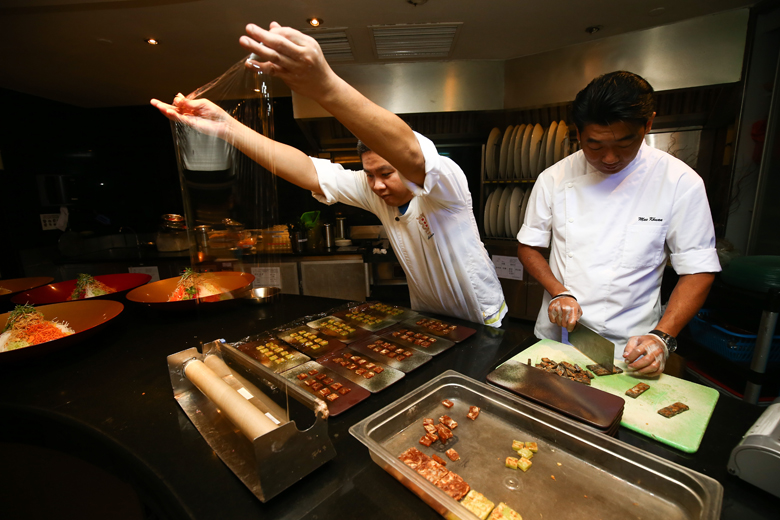Getting the taste for healthier sugar: TungLok opts for novel sugar substitute in classic dishes
Sign up now: Get ST's newsletters delivered to your inbox

TungLok is the first to come on board a Health Promotion Board drive that aims to encourage companies to replace some sugar with healthier alternatives as part of the war against diabetes.
PHOTO: LIANHE ZAOBAO
Follow topic:
SINGAPORE - When TungLok founder Andrew Tjioe decided to reduce the sugar in some of the restaurant group's signature dishes, his biggest concern was taste.
He and his team would sit down for taste tests to compare the healthier products against the originals. These included Chinese New Year favourites such as nian gao and yusheng, as well as classics such as mango pudding and glazed pork ribs.
"For the nian gao alone, we tasted it at least eight or 10 times," said Mr Tjioe, who is chief executive of TungLok Restaurants, which runs 20 food outlets in Singapore.
"The taste has to be the same as the original. You have to compare them until you yourself cannot tell the difference."
The reimagined dishes incorporate allulose - a sugar substitute that can be found in jackfruits and figs. Unlike regular cane sugar, which has four calories per gram, allulose has only 0.4 calories per gram.
However, it is also significantly more expensive. While regular table sugar goes for $1 per kg, the same amount of allulose sells for $6 to $9 per kg.
But Mr Tjioe said that the prices of dishes using this new ingredient have not gone up compared with last year. "Sugar is just one component," he added. "The packaging can be more expensive than that."
Studies have shown that replacing some sugar with allulose can slow down the rate at which a person's blood sugar rises. Foods with a high glycaemic index - that is, they cause blood sugar levels to rise rapidly - can increase a person's risk of Type 2 diabetes.
TungLok is the first to come on board a Health Promotion Board (HPB) drive that aims to encourage companies to replace some sugar with healthier alternatives as part of the war against diabetes. The reformulated dishes are now being sold at selected outlets, with festive favourites such as nian gao and yusheng available everywhere.
Apart from just making a dish sweeter, sugar can contribute to a product's texture, said HPB food scientist Eunice Pang.
Slashing the use of sugar in dishes, or replacing it with healthier substitutes, can therefore be challenging.
Mr David Yim, founder of local ice cream chain Udders, which made two ice cream flavours for TungLok, said that using allulose instead of sugar was not easy.
"The coconut ice cream took us three weeks, and we tried nearly 50 variations," said Mr Yim. "Glucose affects the melting point and texture, so it's not so straightforward to replace."
Earlier iterations of the ice cream melted too quickly or were too hard, he added.
Besides allulose, HPB is also encouraging the use of another sugar alternative known as isomaltulose - which comes from sugar beets - and special fibres which aim to replace the other functions that sugar plays in food.
By 2020, the board aims to have Singaporeans cut their sugar consumption by a quarter, and increase the role that unrefined carbohydrates such as wholegrains play in the average person's diet.
Today, an average Singaporean consumes 12 teaspoons of sugar a day. The recommended daily intake is nine to 11 teaspoons.
Cutting sugar intake by 25 per cent is a good figure to aim for, said dietitian Jaclyn Reutens, who is from Aptima Nutrition and Sports Consultants. "If it's 5 to 10 per cent, the impact on health would probably be insignificant."
She added that some people may have preconceived notions about the tastiness of healthy food. "They should think about it with an open mind," she said. "Do not think that healthier food has to have less taste."
As a general rule, alternatives to sugar tend to be described as having a less intense sweetness.
Civil servant Jonathan Lim said that he has no qualms about sugar substitutes being used in his food.
"As long as it still tastes good, why not?" said the 30-year-old. "But they shouldn't drive up the price for consumers if sugar substitutes are more expensive."

